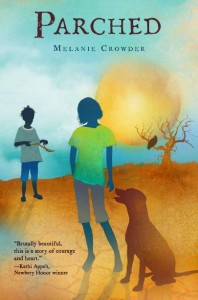This past month has gone into the record books as the rainiest June in my city’s history. Last year was one of the warmest on record, and in late October a rare East Coast hurricane devastated the New York metropolitan area.
At the same time as storms batter the East Coast of the United States, much of the world has experienced drought as a result of deforestation and global climate change. It is predicted that huge parts of Africa and South America will run out of water in the next century if we don’t find alternatives to fossil fuels that are raising carbon dioxide levels and contributing to the heating of the planet.
 Melanie Crowder’s spare and powerful middle grade novel Parched takes place in southern Africa sometime in this next century. The water has run out, and with it, all order and civilization. Sarel’s family has lived for decades on their farm, where they grew their own food and bred beautiful Rhodesian ridgeback dogs. But a gang has attacked the farm, killed Sarel’s parents, taken everything of value, and burned the rest. Sarel is left with the surviving dog pack led by matriarch Nandi, who narrates the unforgettable first chapter that ends:
Melanie Crowder’s spare and powerful middle grade novel Parched takes place in southern Africa sometime in this next century. The water has run out, and with it, all order and civilization. Sarel’s family has lived for decades on their farm, where they grew their own food and bred beautiful Rhodesian ridgeback dogs. But a gang has attacked the farm, killed Sarel’s parents, taken everything of value, and burned the rest. Sarel is left with the surviving dog pack led by matriarch Nandi, who narrates the unforgettable first chapter that ends:
I snarl. Sarel-girl gets up on hands, on knees. I step on shoulders, push girl belly to dirt. Sarel-girl makes angry sound, fear sound. LOUD. I hold back of neck with teeth. I growl, soft.
Thando licks salt drips from her face.
Fire scent. Crackle sound.
Engine sound. Black snakes on dirt, spinning dust.
Death scent.
Musa is from the city. His mother has given him the ability to find water, but she is dying of sickness, and his older brother has sold him to a gang. But water is hard to find, and when he finds sewer water, the gang members beat him. He escapes and finds Sarel, but there is no water to save them.
The children’s quest, along with the dogs, to survive in the bleak desert while being pursued by Musa’s gang, will keep readers turning the pages. But this is more than an adventure story. One reader wrote, “I will never take a glass of water for granted again.” We shouldn’t. This book explores our responsibility to each other, to people who live close by and far away, to other living things, and to the planet.
Shortly after finishing Parched, I co-hosted my bilingual radio show on WRPI, “Los Vientos del Pueblo,” where Mario and I played the song “Pare” (“Father”) by the famous Catalan singer Joan Manuel Serrat as part of a segment of Latin American and Iberian songs on environmental themes. (To hear the full song in Catalan with Spanish translation, click the link below.) Serrat’s famous song sums up Crowder’s equally eloquent and compelling novel.
“Father, tell me what have they done to the river
that it no longer sings?
It slips like a dead fish
under a clump of white foam.
Father, the river is no longer the river.
Father, before summer returns
hide everything that lives and breathes…”
https://www.youtube.com/watch?v=CfFzVoEtVEI&list=RD02bEHJcoY202M
1 comment for “When the Water Runs Out: A Review of Parched”